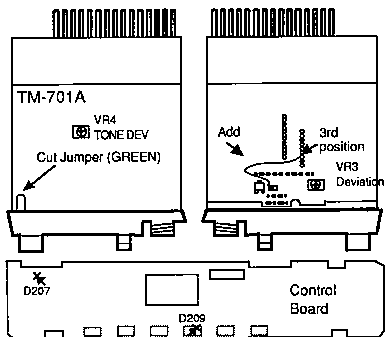Kenwood TM-701A
Operating dual band on 2-meter and 70-cm ham radio bands, this transceiver is very compact and features 20 memory channels and multi-scan functions. It has the same chassis as Kenwood TM-231a/431a series and shares many of the accessories.
Options
Review
Basic Usage
Programming
Modifications
Available modifications:
- cross-band repeater
- transmitting and receiving from 136-175MHz
- prevent intermittent memory loss due to pulses on the CPU interrupt line
Extended Transmit
1 Disconnect the power and antenna.
2. Remove the top and bottom cover.
3. Remove knobs from front panel and the nuts from the mic and channel switch.
4. Remove 4 screws holding the front panel and the 3 screws on the control board.
5. Locate the green jumper wire sticking out the front panel, behind the VFO button
6. Cut the green jumper and tape the edges to prevent them from shorting.
Cutting the green jumper allows the TM-701A to transmit from 142 to 151.995 MHz.
Cross Band Repeat Mod
Perform steps 1 - 6 above and continue...
7. Optional: Install diodes D207 & D209 on control board X57-3350-00.
8. Solder a jumper to the foil side of the TX-RX board as shown in drawing.
9. Reassemble the radio.
10. Reset the microprocessor (Press and hold [MR] while turning on the power).
The repeater cross-band operation allows the TM-701A to receive on one band and re-transmit the signal on the other band. The TM-701A alternately displays the two bands until a signal is received. The transceiver will then display the band that is re-transmitting the signal. The shift function cannot be used during the repeater cross-band operation. If the TONE or CTCSS function is required, only one EIA tone can be used for the two bands.
CROSS BAND OPERATING PROCEDURE
Turn on the Repeater mode-
- Press and hold [F] and then press [DUP].
- Then Press [F} longer than 1 Second. The F indicator will blink.
- Press[LOW]. Three dots should appear in the display when the mode is on.
Turn off
- Press [VFO].
The information was provided to you for free. Use at your own risk. You can copy the information and you do not have to worry about advertisements or JavaScript here!

